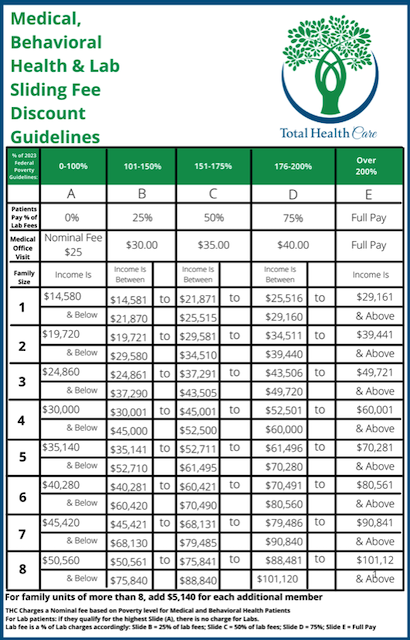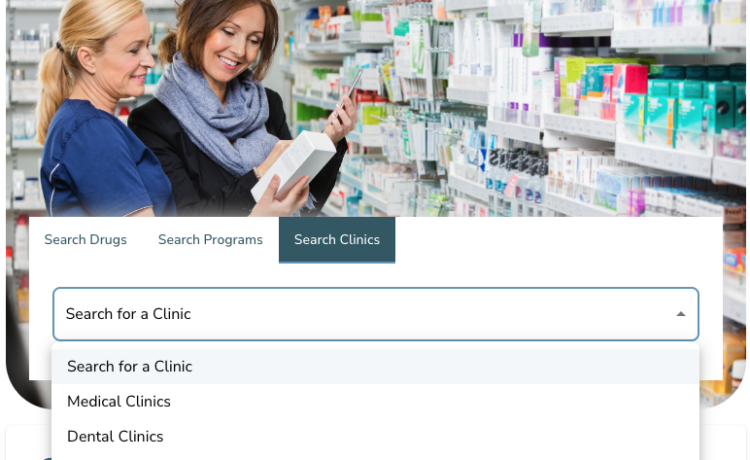One misconception about our services is that they’re only available to those who meet income requirements, but that’s far from the truth. For example, your insurance might come with a high deductible which could keep you from accessing care for certain services. Or you have fallen out of eligibility for state Medicaid programs which kicked thousands of people off after COVID-19 protections ended last year. Whatever the case, we serve anyone in diverse financial situations looking for cost-effective options regarding their healthcare. A useful tool you should consider is our Free, Low-Cost, and Sliding-Scale clinic locator, which offers the ability to search for over 19,000 health care facilities that accept anyone regardless of income status. Sliding-Scale clinics in particular should be on your radar if you don’t meet income requirements for most assistance programs.
What Are Sliding-Scale Clinics?

They are community-based healthcare facilities that offer health services at a reduced cost based on a patient’s income and ability to pay. These clinics understand that not everyone can afford the ever-increasing costs of medical care, so they adjust their fees according to an individual’s financial situation. The concept is simple: the less you earn, the less you pay.
Most income-based clinics receive funding through the Health Resources and Services Administration (HRSA), an agency of the US Department of Health and Human Services. These clinics, often called Federally Qualified Health Centers (FQHC), are strategically placed in underserved communities who need them the most.
Sliding-scale clinics are healthcare centers that adjust their fees based on a patient’s income and ability to pay. These clinics aim to make healthcare affordable for everyone, operating on a simple principle: the less you earn, the less you pay.
Many of these clinics receive funding from the Health Resources and Services Administration (HRSA), a branch of the U.S. Department of Health and Human Services. Federally Qualified Health Centers (FQHCs), located in underserved communities, are a prime example of such clinics.
Non-Federally Funded Clinics Offering Discounted Pricing
While many sliding-scale clinics receive federal funding, there are also numerous non-federally funded clinics committed to providing affordable healthcare. Here’s how they contribute:
Non-Profit Organizations: Non-profits such as Planned Parenthood are well-known for their commitment to providing affordable healthcare. They offer a wide range of services, including reproductive health care, cancer screenings, and general health exams, on a sliding-scale basis. This ensures that even those with limited financial resources can access necessary medical care.
Local Health Departments: These departments often run community clinics that provide services like immunizations, maternal and child health services, and infectious disease screenings. They operate on a sliding-scale basis to ensure that low-income residents can access these essential health services without financial burden.
Hospitals: Many hospitals, particularly those with a mission to serve their communities, offer sliding-scale fees for primary care services. These hospitals understand the financial challenges faced by many patients and reduce fees accordingly to ensure broader access to healthcare. Services often include general medical care, emergency services, and specialized care such as cardiology or oncology, all adjusted based on the patient’s ability to pay.
You can find all types of these clinics on our website (we’ll get to that soon).
Are These Clinics Free?
The fees at sliding-scale clinics depend on your household size and income. You’ll typically need to fill out a form to verify this information, allowing the clinic to adjust pricing accordingly. While insurance isn’t mandatory for discounted pricing, paying out of pocket is required if you don’t have insurance. Most clinics do accept insurance.
Sliding-scale clinics must operate in a manner where no patient is denied service due to an inability to pay. They prepare a schedule of fees consistent with local rates and create a sliding fee discount schedule (SFDS) based on a patient’s ability to pay. Here’s how it works:
Full Discount: Available for individuals and families with incomes at or below 100% of the Federal Poverty Guidelines (FPG). Nominal charges might apply, but only if they align with the clinic’s goals.
Partial Discounts: For those with incomes between 100% and 200% of the FPG, with fees adjusted based on income.
No Discounts: For those with incomes above 200% of the FPG.
Health centers demonstrate compliance by having a sliding fee discount program that applies to all required and additional services, ensuring patients are charged based on their ability to pay. To determine your eligibity and see what you qualify for, we encourage you to use our Federal Poverty Level (FPL) Calculator. Check out our TikTok video on how to use it (be sure to like and subscribe!)
What Services Do Sliding-Scale Clinics Provide?
Health services can vary depending on the clinic you go to. While many provide essential primary care services, the extent of specialized care may depend on the clinic’s resources and community partnerships. Dental, mental health, and pharmacy services may or may not be available.
FQHCs, however, are federally mandated to provide comprehensive healthcare services, including primary care, dental, mental health, and pharmacy services.
How Can I Find a Sliding-Scale Clinic on the NeedyMeds Website?
Locating a clinic near you is quicker (and easier!) than ever with our new website redesign! Our clinic finder is located on the front page of our website for your convenience.
- Select “Search Clinics” on the NeedyMeds homepage.
- Depending on your needs, search for Medical, Dental, Mental Health, or Substance Use Disorder Clinics using your zip code or state. Keep in mind that a clinic may offer one or all of those services, so you may not see all that’s available. For example: If you’re mainly looking for dental services, be sure to search for Dental Clinics as opposed to Medical Clinics.
- Enter your zip code to find clinics near you, or search for all available clinics in your state.
- Check the Fees section under Eligibility to understand the pricing structure—free, low-cost, or sliding scale.
For further assistance, contact our helpline at 800-503-6897.



